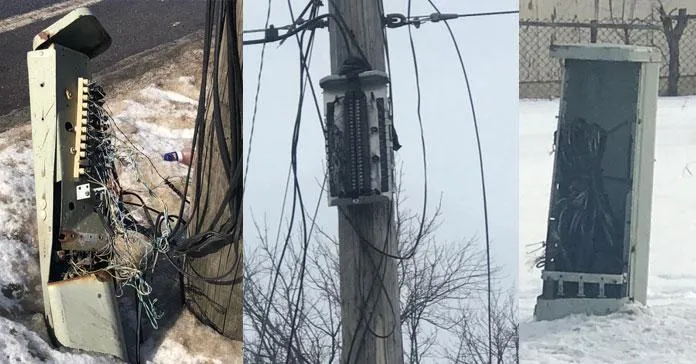New Report: AT&T Cutting Jobs, Abandoning Rural Communities In Michigan

MICHIGAN - A new report from the Communications Workers of America (CWA) shows that AT&T is neglecting rural and suburban communities in Michigan, cutting its workforce and creating service problems for customers and public safety hazards throughout the state. Despite promises to create jobs and serve rural customers, AT&T has eliminated Michigan jobs and failed to invest adequately in the next-generation networks that Michigan’s families and businesses need to access today’s data-intensive online services.
In many Michigan communities, AT&T voice service is a lifeline for customers, yet in much of the state AT&T has not upgraded its copper network to fiber to better serve customers. The new report from CWA shows that in Michigan and other states throughout the Midwest, AT&T copper cable - for many the only source of landline phone and Internet - is significantly damaged. Despite the clear need for an updated telecommunications network, AT&T continues to cut jobs and close call centers in Michigan, devastating families and upending lives.
AT&T lobbied for the Tax Cut and Jobs Act and said it would use its resulting increased profits to create more good middle-class jobs and raise wages, but the company has eliminated over 23,000 jobs since the bill passed. The new report from CWA shows that between January 2017 and January 2019 AT&T:
- Reduced its outside plant technicians in Michigan by 26 percent, dropping from 2,304 technicians to just 1,704;
- Reduced its total Michigan wireline workforce – outside technicians, inside technicians, call center workers, and administrative staff – by 26 percent, from 4,157 to 3,067 workers across the state;
- Reduced its Michigan call center workforce by 46 percent in the last two years.
These job cuts come even as the company received a $21 billion windfall from the tax bill and is projecting $3 billion in annual tax savings going forward. AT&T’s SEC filings also shows the company boosted executive pay and suggests that after refunds, it paid no cash income taxes in 2018 and slashed capital investments by $1.4 billion.
“AT&T has turned its back on rural and suburban communities in the Midwest by eliminating jobs, advocating for deregulation and cutting investments in these areas,” said Linda L. Hinton, Vice President of CWA District 4. “In states like Illinois, Indiana, Ohio, Michigan and Wisconsin, AT&T is failing the many communities that rely on the company’s services as a lifeline. We will not stand idly by while AT&T receives billions in tax benefits but turns a blind eye to our nation’s crumbling infrastructure. It’s time for AT&T to provide answers about where all that extra income is going.”
CWA supports continued investment in next-generation fiber and wireless networks. Meanwhile, AT&T has a statutory obligation to ensure “reasonably adequate service and facilities” in the state, yet through systemic neglect of its traditional landline network, many Michigan customers may no longer rely upon AT&T to provide reliable telecommunications service.
Michigan severely reduced public oversight of the telecommunications industry with the passage of House Bill 4314 in 2011. Deregulation proponents argued that competition could replace regulatory protections that held AT&T accountable for the quality of its service and, by extension, the condition of its network. But as the evidence in this report indicates, eliminating public oversight and relying solely on competition has failed to ensure that AT&T meets its statutory obligation to provide quality service to everyone in Michigan.
“As the Chair of the Michigan Legislative Labor Caucus, I share the concerns of the Communications Workers. Basic infrastructure for landlines is important for many of my people, especially senior citizens. It is even more important in the rural areas of Michigan, where our citizens are not reaping the benefit of new technologies,” said State Representative Brian K. Elder, Chair of the Michigan Legislative Labor Caucus. “The Michigan legislature has been supportive of telecommunications companies when they introduce new technology to improve their networks for cell phones, and I have proudly supported these advances. In fairness, I believe that the telecommunications industry should not neglect those who rely on landlines for their safety and daily communications.”
Because of the lack of public oversight, CWA is encouraging AT&T customers in Michigan to share information about internet and phone service issues on a new website, ATTBrokenPromises.org/MI, so that elected leaders in Michigan can better understand the problems that their constituents are facing and hold the AT&T accountable for its deteriorating network.
Read the new report here: AT&T:Abandoning Rural and Other Communities in Michigan
BACKGROUND
CWA has been leading the charge to hold AT&T accountable to the jobs promises the company made as part of its effort to pass the Tax Cut and Jobs Act. In March, CWA President Chris Shelton testified in front of the House Ways and Means Committee about the impact of the Tax Cut and Jobs Act on American workers, and called on Congress to probe AT&T on how it is spending its tax cut money, saying: “You may ask ‘what is AT&T doing with this money if it’s not being used to create jobs and invest in the U.S.?’ We’d like to know as well.”
CWA’s contracts with AT&T’s Midwest and national Legacy T units expired over a year ago, the contract at AT&T Mobility in Puerto Rico has also expired, and negotiations will begin soon at AT&T Southeast, where the contract expires in August. AT&T has a history of constructive labor relations, but its insistence on eliminating long-term employees to reduce costs has undermined the trust of its workforce.
###
🚨🟠📢 CWA / AT&T 2026 “Orange” Mobility Contract Bargaining Report #7 📢🟠🚨
CWA and Allies File Comments Supporting FCC Oversight of Voice Service in the Internet Age
Legacy T and Activision Members Meet With CWA President Cummings in Minneapolis

